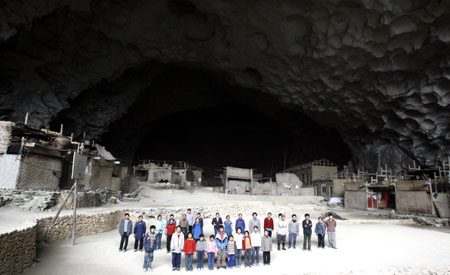Paul-o-Rama
Active member
http://www.chinadaily.com.cn/photo/2007-01/17/content_786007.htm
In the caverns deep in the mountain in Anshun of southwest China's Guizhou
Province, live nearly a hundred villagers. People of the Tajing village, all
from the Miao minorrity group, have lived there for centuries.
Central cave, the largest cave in the area, is 230 metres long, 115 metres
wide and 50 metres high. The cave-dwellers drink the water that drips from the
stone, and make a living by growing grain on the hillside near the cave. They
have developed into a whole tribal community with houses made of bamboo, barns,
and even a primary school in the cavern.
Most of men in this community have left for cities to make money, while those
who stayed are struggling to build a water reservoir in the cave to solve the
water shortage.
Thirty-year-old Luo Mei and her family lead an enviable life in the village.
They are running the only hotel in the area, and have electric appliances such
as televisions, a refrigerator, and an induction cooker.
The local government has tried every means to build houses to persuade the
villagers to move from the caves but have failed. A number of families prefer to
stay and have declined to move.
In fact, they are not isolated from the outside. They have televisions and
the caves have telecommunication signals.
In the caverns deep in the mountain in Anshun of southwest China's Guizhou
Province, live nearly a hundred villagers. People of the Tajing village, all
from the Miao minorrity group, have lived there for centuries.
Central cave, the largest cave in the area, is 230 metres long, 115 metres
wide and 50 metres high. The cave-dwellers drink the water that drips from the
stone, and make a living by growing grain on the hillside near the cave. They
have developed into a whole tribal community with houses made of bamboo, barns,
and even a primary school in the cavern.
Most of men in this community have left for cities to make money, while those
who stayed are struggling to build a water reservoir in the cave to solve the
water shortage.
Thirty-year-old Luo Mei and her family lead an enviable life in the village.
They are running the only hotel in the area, and have electric appliances such
as televisions, a refrigerator, and an induction cooker.
The local government has tried every means to build houses to persuade the
villagers to move from the caves but have failed. A number of families prefer to
stay and have declined to move.
In fact, they are not isolated from the outside. They have televisions and
the caves have telecommunication signals.
